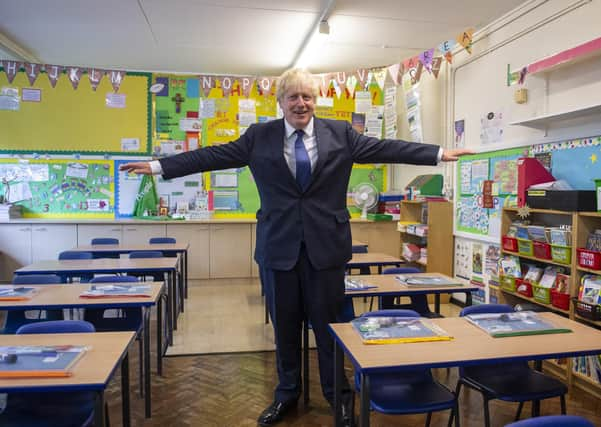Covid has exacerbated funding crisis for Yorkshire’s schools: Fiona Spellman


We must stand behind those across education who have been on the frontline of battling Covid and ensure they are not forced to choose between the welfare of their students and financial hardship.
Even before lockdown began, data from the School Cuts Coalition showed a shortfall in funding across Yorkshire of almost £500m, with 90 per cent of schools affected, and with the heaviest burden often falling in the poorest areas. Analysis from the Institute for Fiscal Studies has shown that per-pupil funding has fallen by eight per cent since 2010, just as needs have been rising in many areas.
Advertisement
Hide AdAdvertisement
Hide AdThe financial challenges wrought by Covid on our education system are real and many places aren’t getting anything like enough help. Educational leaders are having to find funds to cover additional cleaning costs, cover for absent staff and additional measures to support social distancing, all from within existing resources. This is forcing them to make impossible decisions between the physical safety of their pupils and staff and their wider needs. Just like businesses, schools have faced rapidly rising costs in order to stay open, but unlike businesses, schools are not eligible for grants to alleviate such pressures.
The Government is seemingly well aware of the situation. Ofsted issued a report this week on the impact of Covid on schools and learning. It made for grim reading. Inspectors found while “senior leaders across the board are working more intensively than ever and showing remarkable resilience”, many had expressed concerns about over-stretched budgets. The same report revealed how the children hardest hit by Covid pandemic – often those who are already the most disadvantaged – are regressing in basic skills and learning. Some younger children whose parents were unable to work flexibly, and who experienced less time with parents and other children during lockdown, have been moving backwards in both numbers and words.
Among older children, inspectors found that many now lack stamina in reading and writing; some have lost physical fitness; and others are showing signs of mental distress. Meanwhile, the gaping attainment gap between the poorest students and their wealthier peers had stopped narrowing even before lockdown began. It seems inevitable the learning loss of the past six months will only serve to heighten the problem.
These are thorny issues for schools to handle at the best of times. And these are certainly not the best of times. Our teachers are innovative, creative and adaptable and they are already making tremendous strides in addressing these problems. But there is only so much they can do without additional support. If we are to emerge from this pandemic in a strong position, then a good education for all young people has to be top of the policy agenda.
Advertisement
Hide AdAdvertisement
Hide AdWe recognise that just about every sector of our society is currently demanding substantial support to help them bounce back, or simply survive, and it is impossible to keep everyone happy. But few could argue against the importance of ensuring the futures of our children.
The Government’s £1bn catch-up fund does not present a solution to this problem – £650m of this will be spread evenly across all schools and will not therefore be used to specifically support the places where we know Covid has had the greatest effect.
The remaining £350m has been allocated for additional tuition programmes which, while valuable in their own right, can’t hope to compensate for a looming crisis in core funding across the education system. Moreover, special schools, early years settings and post-16 students have all missed out from any additional targeted support.
That’s why SHINE is backing a petition that is calling for the Government to fully fund schools for Covid-19 costs and provide relief for loss of income, and we’d encourage people across Yorkshire to do the same.
Advertisement
Hide AdAdvertisement
Hide AdIt is crucial for the future development of the North, and our country as a whole, that all our schools receive the basic resources that they need to support the children in their care.
The petition can be found at https://petition.parliament.uk/petitions/555718.
Fiona Spellman is CEO of Yorkshire-based education charity SHINE.
Support The Yorkshire Post and become a subscriber today. Your subscription will help us to continue to bring quality news to the people of Yorkshire. In return, you’ll see fewer ads on site, get free access to our app and receive exclusive members-only offers. Click here to subscribe.
Comment Guidelines
National World encourages reader discussion on our stories. User feedback, insights and back-and-forth exchanges add a rich layer of context to reporting. Please review our Community Guidelines before commenting.